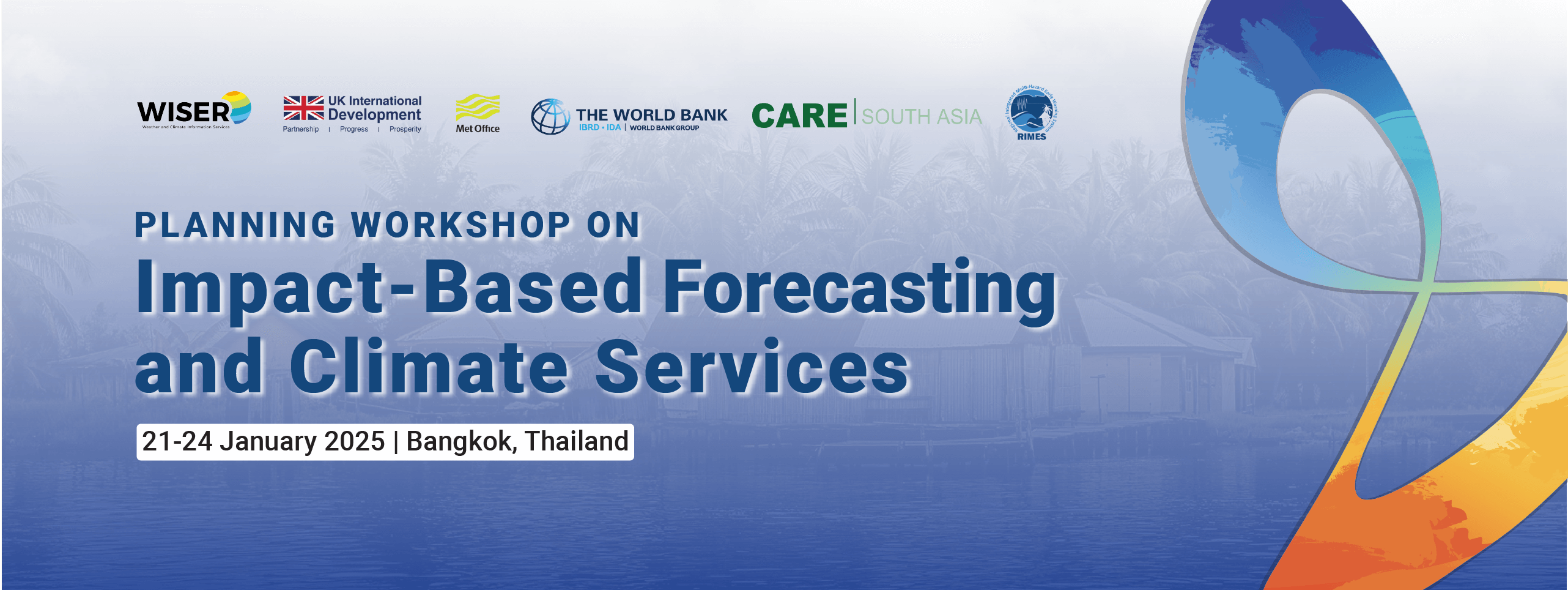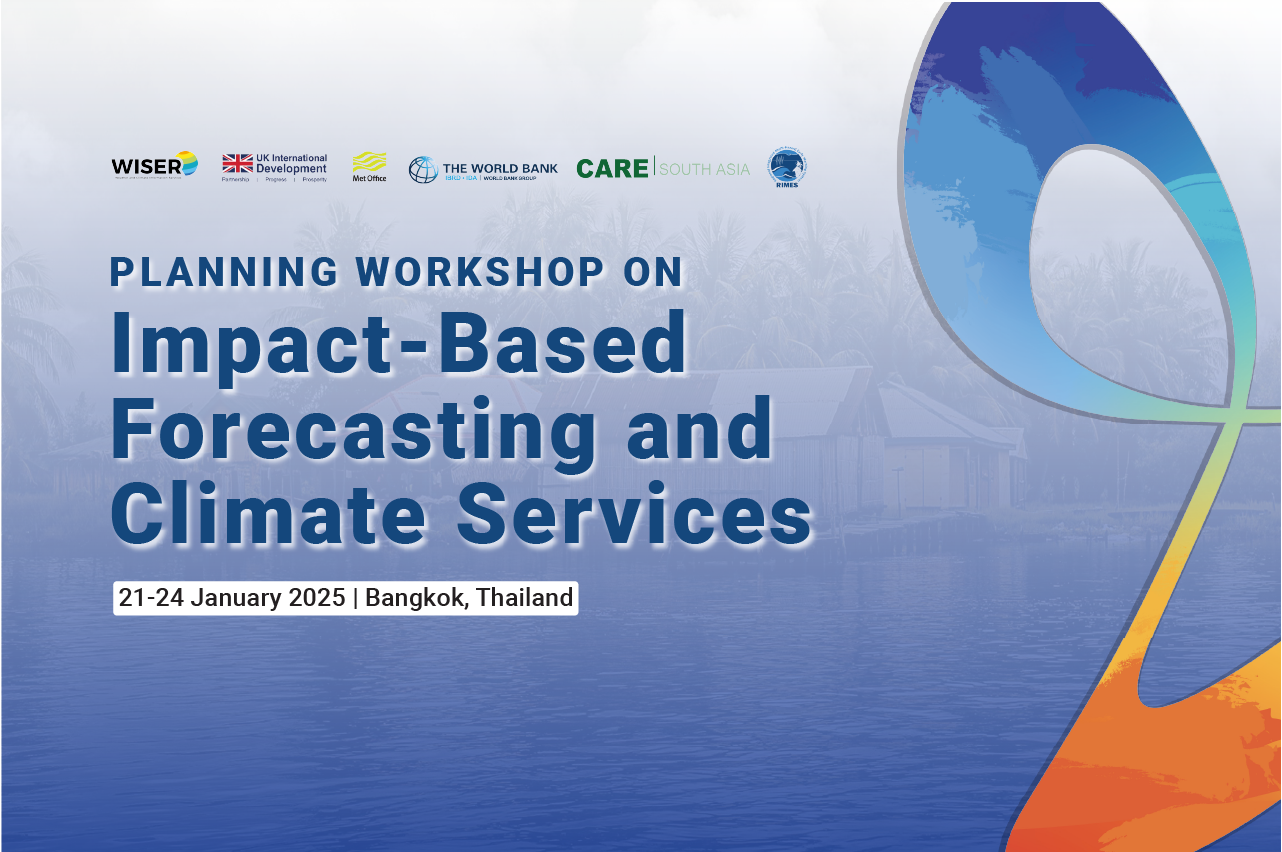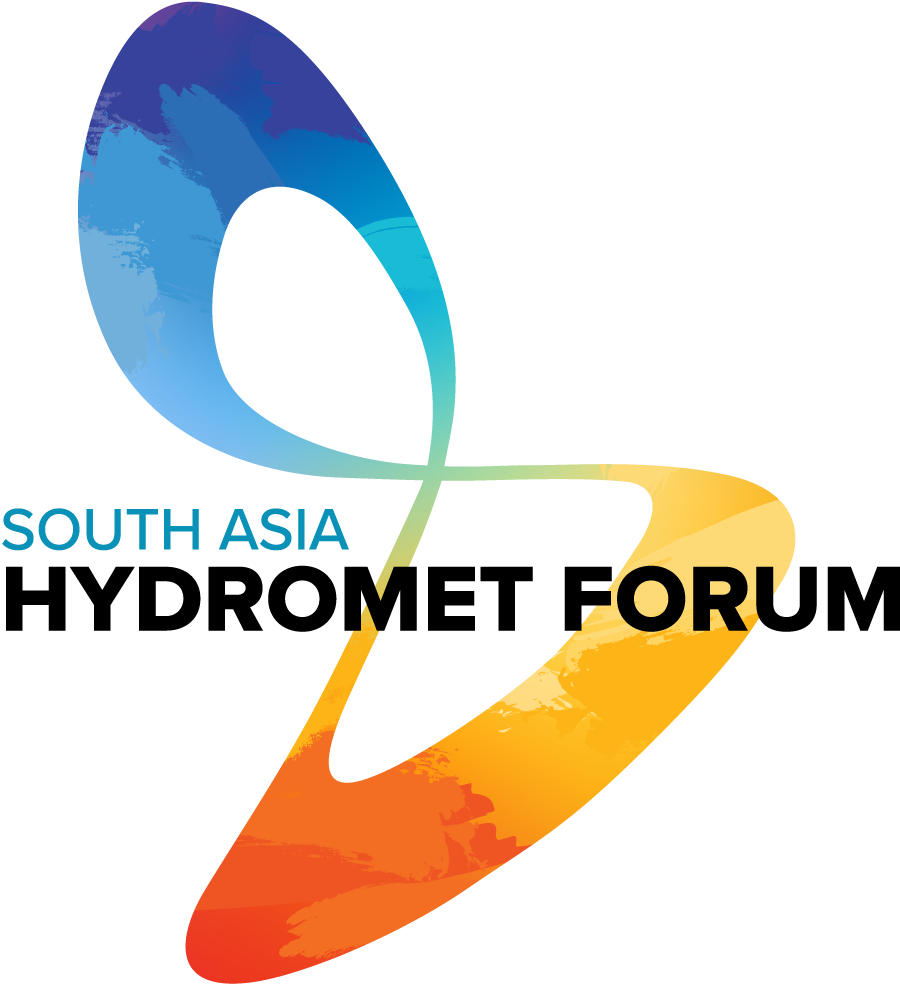Planning Workshop on Impact-Based Forecasting (IBF) and Climate Services
- January 21-24, 2025
- Bangkok, Thailand


The South Asia Hydromet Forum (SAHF) is hosting the Planning Workshop on Impact- Based Forecasting (IBF) and Climate Services in Bangkok from January 21–24, 2025. This event will convene key stakeholders to advance regional efforts in managing extreme weather events and enhancing resilience to climate change across South Asia.
The workshop will focus on strengthening regional frameworks and fostering collaboration among National Meteorological and Hydrological Services (NMHSs) and other partners. It builds on strategic priorities identified during the 3rd SAHF Executive Council Meeting (December 2023) and the SAHF IV Conference (February 2024).
Focus Areas:
- Impact-Based Forecasting (IBF): Development of comprehensive regional strategies, pilot projects, and toolkits to improve early warning systems and disaster preparedness.
- Climate Services: Enhancing regional understanding and frameworks to support climate-informed decision-making and sustainable development
The workshop is supported by leading technical partners, including the Regional Integrated Multi-Hazard Early Warning System (RIMES), the UK Met Office, and the World Bank, reinforcing SAHF’s mission to promote regional collaboration and resilience-building.
- Overview
- Agenda
- Speakers
The South Asia Hydromet Forum (SAHF) facilitates regional collaboration among its member countries: Afghanistan, Bangladesh, Bhutan, India, Maldives, Myanmar, Nepal, Pakistan, and Sri Lanka. Regional Integrated Multi-Hazard Early Warning System (RIMES) is the technical secretariat to the SAHF. The 3rd SAHF Executive Council meeting (December 2023) and subsequent SAHF IV conference (February 2024, see Annex A) agreed to deepen and broaden its activities in priority areas, including Impact Based Forecasting (IBF) and climate services. The SAHF IBF Working Group (WG), established in 2021 provides a mechanism to support regional training, learning and knowledge exchange amongst NMHSs and key users of services across South Asia.
Impact Based Forecasting: Development and capacity building of IBF approaches has been identified as one of the key priorities for SAHF. Since 2019 a number of partner initiatives such as UK MET Office through ARCC/ WISER and World Bank through SAHF Phase 1 and CARE Project have been supporting SAHF IBF . Based on agreements of the SAHF IBF WG meeting (Bangkok, Thailand, 31 July 2024) and climate services side session at SAHF IV (Colombo, Sri Lanka, 8 February 2024) the proposed IBF Workshop to be held in Bangkok from 21-24 ,2025 will have following objectives and outcomes
Climate services: The last two days of the workshop will be dedicated on NFCS and its link with IBF within the framework GFCS.
IBF - Sessions
Objectives:
- Further develop key priorities for the IBF working group, informed by strategic direction from the SAHF EC, outcomes of SAHF IV, and subsequent priorities identified by the working group.
- Take stock of IBF development, needs, opportunities and priorities in SAHF Member Countries, with a view to piloting common hazard/s and approaches across the region.
- Translate priorities into a clear implementation plan(s) for the SAHF IBF working group to enable allocation of partner / program resources over 2025-28.
- Agree roles of SAHF IBF WG member countries, regional and international partners in supporting delivery of the IBF implementation plans.
- Initiate development of toolkit approach to support the design, development, implementation and sustainability of IBFEWS in the region, under SAHF.
- Establish IBF link with Climate Services.
Expected Outcomes:
- Development of clear, resourced implementation plan(s), with defined roles and responsibilities of members and partners addressing priorities of the SAHF IBF WG for the period 2025-28. Aligned and linked to other SAHF WG priorities and plans.
- Establishment of a regional framework ‘toolkit’ approach to support implementation, mainstreaming, and sustainability of IBF across South Asia and in SAHF Member Countries.
- Agreement and initiation of ‘piloting’ and knowledge sharing mechanisms across common hazard/s and geographies across the South Asia region.
- IBF link with Climate services established.
- Informing paper for approval by SAHF EC.
CLIMATE SERVICES - Sessions
Objectives:
- Improve understanding of availability, application and needs for climate services, at different scales.
- Stocktake of National Frameworks for Climate Services (NFCS), and identification of opportunities and barriers to advance NFCS development, including role of NMHSs.
- Informed by the above, identification of key priorities for a climate services component under SAHF.
- Agreement of an interim climate services WG.
Expected Outcomes:
- Improved understanding of climate services in the South Asia region and identification of initial priorities and outline work plans SAHF.
- Climate services WG established with agreed roles and responsibilities.
- Informing paper for approval by SAHF EC.
| DAY 1: Tuesday 21st January | |||
|---|---|---|---|
| Agenda Item | Timing | Moderator/Speaker/Presenter(s) | Content |
| Session Chair: Ms. Helen Caughey, UKMO | |||
| Welcome Remarks | 9:00-9:15 | Dr. K.J. Ramesh, RIMES Mr. David Corbelli, UKMO | |
| Introductions | 9:15-9:45 | Mr. Raihanul Haque Khan, RIMES | - Participant and facilitator's introductions |
| Workshop Overview and Objectives | 9:45-10:15 | RIMES/Met Office | - Ensure broad framing and awareness of SAHF - EC declaration/s, SAHF IV outcomes and commitments |
| Coffee Break | 10:15-10:30 | ||
| Progress of Regional and National plans and priorities for IBF development | 10:30-12:30 | IBF WG leads RIMES / World Bank / University of Salford RIMES / Afghanistan Bangladesh Bhutan India Nepal Maldives Myanmar Pakistan Sri Lanka | - Review of current IBF WG priorities - Review of available DSS to support IBF - Decision Support Systems and the Link to IBF - Poster presentations - Interactive Session: Potential solutions to crowdsourcing challenges identified |
| Lunch | 12:30-13:30 | ||
| Session Chair: Dr. Anshul Agarwal, RIMES | |||
| Progress of Regional and National plans and priorities for IBF Development (continuation) | 13:30-15:30 | All | - Conclusion of ‘posters’ if any still outstanding. - Breakout interactive session on crowd sourcing potential solutions to challenges identified in the posters. - Facilitation of poster discussion session. |
| Coffee | 15:30-16:00 | ||
| Regional and national coordination with institutions supporting SAHF and other fora/platforms in the SAHF geography | 16:00-17:00 | Dr. Giriraj Amarnath, Principal Researcher Disaster Risk Management and Climate Resilience, IWMI Dr. Sanjay Srivastava, Chief, Disaster Risk Reduction ICT and Disaster Risk Reduction Division, UN Economic and Social Commission for Asia and the Pacific (ESCAP) Dr. Jothiganesh Shanmugasundaram, Regional Technical Lead, WFP Mr. Birendra Bajracharya, Project Coordinator; Chief of Party-SERVIR-HKH, ICIMOD Dr. Senaka Basnayake, Director for the Climate Resilience Department, Asian Disaster Preparedness Center | - Brief presentations - The AWARE Platform: Bridging Gaps in Early Warning and Anticipatory Action by Dr. Giriraj Amarnath - ESCAP’s Technical Assistance to SAHF by Dr. Sanjay Srivastava - WFP supported IBF and Climate Services activities in South Asia by Dr. Jothiganesh Shanmugasundaram - ICIMOD9s experience in Early Warning and Impact Based Forecasting by Mr. Birendra Bajracharya - ADPC engagement in strengthening IBF & CS in the region by Dr. Senaka Basnayake |
| DAY 2: Wednesday 22nd January | |||
|---|---|---|---|
| Agenda Item | Timing | Moderator/Speaker/Presenter(s) | Content |
| Session Chair: Mr. David Corbelli, UKMO | |||
| Review and summary from day 1. | 09:00-09:30 | Ms. Helen Caughey, UKMO | - Summary of Day 1 discussions |
| Understanding Key Hazards, Challenges and Capabilities | 09:30-10:45 | Ms. Helen Caughey, UKMO | - Interactive session on key hazards, and capabilities (sector or country led) |
| Coffee Break | 10:45-11:00 | ||
| NWP WG Priorities and Plans | 11:00-11:45 | Mr. Quamrul Hassan, Meteorologist, BMD / Co-Chair NWP WG | - Presentation on NWP priorities and plans - Group discussion |
| Capacity Enhancement WG Priorities and Plans | 11:45-12:30 | Ms. Monju Subba, Senior Hydromet Officer, NCHM / Co-Chair CE WG | - Presentation on capacity enhancement WG priorities and plans - Group discussion |
| Lunch | 12:30-13:30 | ||
| Session Chair: Dr. Sanjay Srivastava, UNESCAP | |||
| SAHF and Other Regional Platforms | 13:30-14.00 | Mr. Jochen Luther, Technical Coordinator (Services), WMO | - Role of SAHF in supporting WMO strategy - Summary of role and future direction of WMO platforms (SWFP South Asia and SASCOF) |
| Introduction to IBF Toolkit Approach through Interactive Exercises | 14:00-14:45 | Ms. Helen Caughey, UKMO | - Understanding Forecast uncertainty exercise - “Downscaling” for warnings exercise (highlighting value of co-production using Nepal example) |
| Coffee | 14:45 -15:00 | ||
| Role of human in decision making / value-added services | 15:00-15:30 | Ms. Helen Roberts, Social Meteorologist, UKMO | Understanding ‘human value-added’ aspects to forecasting and early warning |
| Introduction to IBF Toolkit Approach through Interactive Exercises (Part 2) | 15:30-16:45 | Ms. Tony Wisson, UKMO | “Downscaling” for warnings exercise (highlighting value of co-production using Nepal example) |
| Summary and Wrap-Up | 16:45-17:00 | Met Office | Day 2 summary and wrap up |
| DAY 3: Thursday 23rd January | |||
|---|---|---|---|
| Agenda Item | Timing | Moderator/Speaker/Presenter(s) | Content |
| Session Chair: Ms. Ruby Rose Policarpio, RIMES | |||
| Day 2 Summary | 09:00-09:10 | Ms Helen Caughey, UKMO | Summary of day 2 discussions and presentations |
| WISER Asia Pacific Overview | 09:10-09:30 | Mr Henry Thompson WISER AP Project Manager, UKMO | - Overall objective for today – where we want to be/what we want to have identified/planned by the end of today - Introduction to WISER AP including outcomes and objectives, funding mechanisms. |
| Discussion around IBF toolkit development | 09:30-10:00 | Ms Helen Caughey, UKMO | Interactive discussion and planning around potential resources which could be developed following the examples shared yesterday. Identification of potential case studies, and/or specific gaps, challenges etc., |
| Workplan Development | 10:00-10:45 | Met Office | Identification of potential activities under WISER Asia Pacific support to IBF in SAHF |
| Coffee Break | 10:45-11:00 | ||
| Workplan Development | 11:00-12:30 | Met Office | Interactive group discussions developing the activities into a workplan to include; resources, responsibilities, mechanisms, timelines. |
| Lunch | 12:30-13:30 | ||
| Session Chair: Dr. K J Ramesh, RIMES | |||
| GESI approaches and considerations | 13:30-14:30 | Mr Ramiz Khan, Urban Advisor, Red Cross Red Crescent Climate Centre (RCCC) Mr Guigma Kiswendsida, Climate Science Advisor, RCCC | Interactive session sharing experience and techniques for reaching and evidencing impact for vulnerable communities inc., GESI and related areas - RCRC Approaches to reach vulnerable communities - Learnings and Experiences on reach and impact of climate and weather services - Role of GESI in Impact Based Forecasting - GESI Approaches and Considerations Video |
| Presentation on workplan | 14:30-15:15 | Met Office | Presentation on workplan development and refinement of ideas/addressing any gaps/questions |
| Coffee Break | 15:15-15:30 | ||
| Workplan MEL | 15:15-16:00 | Met Office | How are we going to measure and evaluate activities in workplan |
| Summary and wrap up | 16:00-16:30 | Met Office / RIMES | - Summary of key findings - Next steps considering how to maintain engagement and traction. |
| SPECIAL DINNER (Starting 19:00 at the Pinnacle 4 (4th Floor-Intercontinental Side) | |||
| DAY 4: Friday 24th January (Climate Services) | |||
|---|---|---|---|
| Agenda Item | Timing | Moderator/Speaker/Presenter(s) | Content |
| Session Chair: Dr. Rupa Kumar Kolli, Former WMO | |||
| Interactive exercise: roles in climate services | 09:00-09:30 | Met Office | - What is the expertise in the room? - Who is developing CS in their role? - Reflections on successes or challenges in CS |
| Introduction and scene setting | 09:30-10:30 | Met Office | - IBF → Climate Services - Introduction to SAHF CS - Presentation from Dr Satyaban: NFCS India – Sharing of experiences and status - Recap of exploration session at 2024 SAHF and online consultation - Intro to Climate Services |
| South Asia Climate Services in 2030 introduction | 10:30-10:45 | Met Office | Introduction to 2030 exercise |
| Coffee Break | 10:45-11:00 | ||
| South Asia Climate Services in 2030 – what could it look like? | 11:00-11:40 | Met Office/ RIMES | - If we were here in 5 years, what would we like to look back on? - What does success look like? |
| Discussion: Aims for a SAHF WG on Climate Services | 11:40-12:30 | Met Office/ RIMES | - Plenary reflecting back on 2030 vision - Exploration of what a Climate Services WG could do, with examples from other WGs - Including presentations with perspectives from RIMES - What are the other aligned initiatives that are happening? - What would be the impact if we didn’t do this? |
| Lunch | 12:30-13:30 | ||
| Session Chair: Mr. Anshul Agarwal, RIMES | |||
| Deep dive on WG priorities (Carousel Activity) | 13:30-14:45 | Met Office/ RIMES | - Tables with chosen priorities, explore (how, who, gaps, challenges) - Include focus on GESI, ethics |
| Coffee Break | 14:45-15:00 | ||
| Practical Decisions and Workplan Development | 15:00-16:00 | Met Office/ RIMES | - Voting on who, what, how, when? - How often should a WG meet? - Role of RIMES |
| Closing Messages | 16:00-16:30 | Met Office | - Summary of key findings, actions - Maintaining engagement and traction - Next steps and timelines |
- IBF WG leads
- Dr. K. J. Ramesh, RIMES
- Mr. David Corbelli, UKMO
- Mr. Raihanul Haque Khan, RIMES
- RIMES / World Bank / University of Salford
- Dr. Giriraj Amarnath, Principal Researcher Disaster Risk Management and Climate Resilience, IWMI
- Dr. Sanjay Srivastava, Chief, Disaster Risk Reduction ICT and Disaster Risk Reduction Division, UN Economic and Social Commission for Asia and the Pacific (ESCAP)
- Dr. Jothiganesh Shanmugasundaram, Regional Technical Lead, WFP
- Mr. Birendra Bajracharya, Project Coordinator; Chief of Party-SERVIR-HKH, ICIMOD
- Dr. Senaka Basnayake, Director for the Climate Resilience Department, Asian Disaster Preparedness Center
- Ms. Helen Caughey, UKMO
- Mr. Quamrul Hassan, Meteorologist, BMD/ CoChair NWP WG
- Ms. Monju Subba, Senior Hydromet Officer, NCHM/Co-Chair CE WG
- Mr. Jochen Luther, Technical Coordinator (Services), WMO
- Ms. Helen Roberts, Social Meteorologist, UKMO
- Ms. Tony Wisson, UKMO
- Mr. David Corbelli, UKMO



